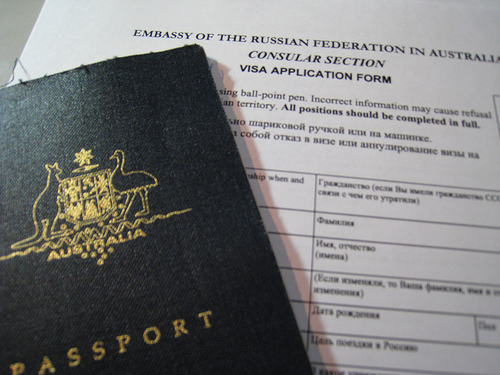
If you’re heading overseas, you may think that all you need for a successful trip besides a fully stocked suitcase is a valid passport, but that may not be the case. Many countries require you to obtain a travel visa whether you’re traveling for business, studying abroad or even for a short tourist stay.
But what exactly is a visa and how do you go about getting one? Here are some of the most common questions asked about visas, and a little bit of background to help you determine whether or not a visa is necessary for your next trip abroad:
What is a visa?
A visa is a stamp or sticker placed by officials of a foreign country on a passport that allows the traveler to enter and exit that country, usually within a specified timeframe.
How is a visa different than a passport?
A visa is technically a supplement to a passport, since both are necessary in the instances where a visa is required. A visa specifies the reason why a person may be staying in the country, such as for work purposes or a study abroad program, as well as the specific time frame travel will be occurring.
How many types of visas are there?
There are over 270 countries that offer travel visas and thousands of different types of visas available based upon country, type of visit and length of visit. Some of the most common types of visas are:
Tourist/Visitor Visa – Tourist visas are required by the host country to allow people to enter the country for visiting purposes. Regulations vary by country; read on for steps to obtain country-specific visa requirements.
Business Visa – A business visa is required for those conducting short business visits or attending conferences in the host country. Unlike a work visa, business visas typically refer to a traveler working for a company that is not located in the host country.
Work/Employment Visa – A work or employment visa is meant for a person legally working in a foreign country and being paid by a company in that country.
Student Visa – Student visas are necessary for a person taking part in studies abroad and who will be returning to their home country afterward.
How can I tell if I need a visa?
Visit the US Department of State to research the need for a visa at least two or three months before your departure date. The International Travel section will allow you to select the specific country you are traveling to and review the U.S. Department of State information for that country. After selecting your destination, be sure to read “Entry/Exit Requirements” section as this will provide additional information, including whether a visa is required. VisaCentral.com is also a convenient website that will confirm whether or not you will need a visa after entering a bit of information about your travel plans. You can also visit your host country’s embassy website for additional information on rules and regulations pertaining to visas.
How do I apply for a visa?
Many countries, such as Australia, Vietnam and Turkey, allow you to directly download a visa application from their embassy’s website. Visit here for a list of U.S. Embassy and Consulate websites. The application will likely require you to submit additional documentation, such as a valid passport, a current passport photo and processing fees, along with your application. Some countries, such as New Zealand, also require proof that you plan to leave the country (such as copies of return travel tickets). Your completed application and accompanying documents will then need to be mailed to the appropriate embassy of the country you will be traveling to; the embassies are typically located in Washington, DC.
How long does it take for a visa to be sent to me?
Obtaining a visa on your own, including mailing the materials and application to your local consulate, the visa processing, and the mailing of your passport back to you, typically takes several weeks. Depending on the type of visa, things could take a bit longer. For example, work visas can take up a couple of months to process! Of course, timing varies depending on your destination’s processing standards. There are also institutions, such as VisaHQ.com, that will conveniently process your visa for you for a fee, and all you have to do is complete an electronic application and provide the required accompanying documents.
If you need a visa quicker than your destination’s embassy or consulate can get it to you, ask your travel assistance provider for recommendations on a reputable third party vendor that specializes in expedited passports and visas.
Now that you have some background on travel visas and how to apply for one, stay tuned for a profile on popular visa destinations and the specific requirements for those countries.
Safe Travels!


